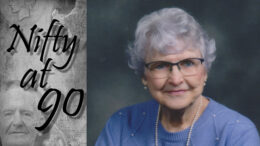A public forum on Friday that featured seven candidates for Venango County commissioner posts provided a synopsis of how they viewed a number of issues.
There was agreement on a variety of topics that focused on county priorities with a significant exception – public funding of libraries and other shared services.
On the dais at the Venango Area Chamber of Commerce forum were Republicans Sam Breene, Tim Brooks, Joe Carulli II, Mike Dulaney and Darrell Karns; Democrats Albert “Chip” Abramovic and Bonnie Summers. Brooks and Abramovic are incumbents.
Inconsistent funding
In 2017, Venango County’s three public libraries – Oil City, Franklin and Cooperstown – were aligned into a single entity: the Oil Region Library Association.
Since the merger, library board members and library Director Dan Flaherty have examined a range of funding opportunities to ensure full access to library services for all county residents.
The libraries’ funding relies, in part, on contributions from townships, boroughs, school districts and cities within the county. The funding stream also includes state allocations, grants, charitable foundations and others.
The patchwork income amounts, though, are as varied as the sources. That confounds the libraries’ budgets, Flaherty said during presentations to Cranberry Township supervisors and other public bodies.
Financial support also determines which communities have full access to all library services. In those areas where no stipend is given to the local library, individuals who wish to access all library services must pay a $30 annual fee for a library card.
A $5 per person fee is a state recommendation to support a countywide system, Flaherty said at a township meeting. He said that $5 per capita standard is used by several counties in Pennsylvania.
Yes and no on per capita tax
The candidates were asked if they would support a county per capita tax to “pay for shared services” such as public libraries.
Karns suggested he is amenable to a per capita tax.
“Libraries are very important,” he said. “… It depends on the rate. A $5 per capita wouldn’t be bad. My feeling is that it depends on the rate.”
Noting public libraries are “community centers … and not about just books,” Abramovic said he was leery of whether future county board of commissioners would continue to support a per capita tax for libraries.
“I fully support giving money to libraries … (but) the next set of commissioners could drop it,” he said. “… I kinda wish for a (public) referendum on a tax.”
While the county has “helped libraries,” including with costs involved in considering the three-county library merger a few years ago, Brooks said, “Taxpayers should be the ones to decide …. (money) for any shared service. You need to be careful in dedicating a tax.”
Although Carulli said he does not favor a library tax, he said he believes libraries are “attractive to new businesses; so perhaps we should look at grants.”
Dulaney answered, “I said we don’t need more taxes … but we need to have the people decide (on a library tax).”
Summers voiced the lone support for a tax to support shared services.
“Ben Franklin said, ‘An investment in knowledge pays the best interest,”’ she said. “Libraries are one of the most fundamental foundations we have. … I favor a dedicated line item in the county budget for libraries (but) I will have to study the tax issue.”































